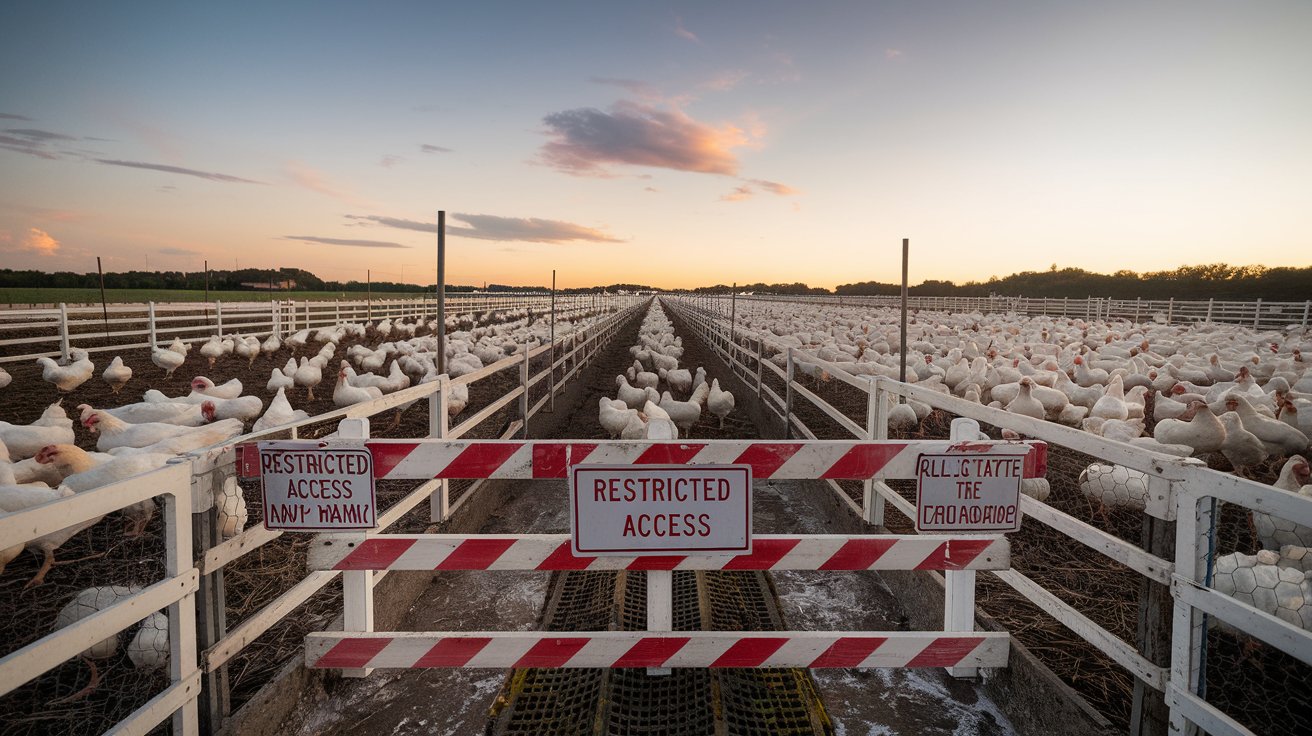Bird Flu Detected in Delaware Poultry Flock; Heightened Vigilance Urged: The detection of bird flu in Delaware has sent shockwaves through the state’s poultry industry, marking the first confirmed case of highly pathogenic avian influenza (HPAI) H5N1 in 2025. This concerning development was identified in a commercial broiler flock in Kent County, where immediate actions were taken to quarantine the affected area and depopulate infected birds. With Delaware being a key player in the U.S. poultry market, the outbreak has triggered swift responses from state officials to prevent further spread.
As farmers brace for the impact and public health agencies increase their vigilance, this case highlights the importance of stringent monitoring and biosecurity protocols to mitigate the effects of avian influenza. In this article, we dive into the details of the outbreak, the measures being implemented, and what this means for the region’s poultry industry.
Table of Contents
The Outbreak: What We Know So Far
On January 3, 2025, the Delaware Department of Agriculture confirmed a presumptive positive case of H5N1 avian influenza in a commercial broiler flock in Kent County. Testing conducted by the University of Delaware’s Lasher Laboratory identified the presence of the virus.
Immediate Actions Taken:
- The affected farm was placed under quarantine.
- Infected birds were humanely depopulated to prevent the virus from spreading.
- Officials assured the public that none of the infected birds entered the food supply chain.
Regional Impact: Delaware and Beyond
This is the first case of avian influenza reported in Delaware in 2025, but similar outbreaks have been observed in neighboring states like Maryland, where over 500,000 birds were affected. The proximity of these outbreaks has heightened vigilance across the region, particularly in states with a robust poultry industry.
Key Concerns:
- Economic Repercussions: The poultry industry is a major economic driver in Delaware and the Mid-Atlantic region. Disruptions caused by the outbreak could lead to increased costs and reduced supply of poultry and eggs.
- Public Health Risks: While the virus predominantly affects birds, there is a low but real risk of transmission to humans, especially for individuals with direct exposure to infected poultry.
What Poultry Farmers Need to Know
Farmers are being urged to enhance biosecurity measures to contain the spread of the virus. These include:
- Limiting access to poultry facilities.
- Using personal protective equipment (PPE).
- Regularly disinfecting equipment and vehicles.
- Reporting any signs of illness in poultry to the Delaware Poultry Health Hotline at 302-698-4507.
Is Poultry Safe to Eat?
Yes, poultry products remain safe for consumption if handled and cooked properly. According to the CDC, cooking poultry to an internal temperature of 165°F effectively eliminates the risk of avian influenza. However, consumers should avoid handling sick or dead birds and practice good hygiene when preparing food.

Public Health Recommendations
- Avoid direct contact with wild birds or domestic poultry exhibiting symptoms such as swelling, lethargy, or unusual behavior.
- If you come across a dead bird, report it to local wildlife agencies rather than handling it yourself.
- Monitor updates from trusted sources like the CDC and local health departments for ongoing guidance.
Why This Matters
The outbreak of avian influenza in Delaware underscores the interconnected nature of public health, agriculture, and economics. By prioritizing safety measures and staying informed, we can mitigate the impact of this outbreak and protect both our communities and the poultry industry.
Conclusion
The recent detection of bird flu in Delaware’s poultry industry serves as a stark reminder of the ongoing risks posed by avian influenza to both public health and agriculture. As one of the leading poultry-producing states in the U.S., Delaware faces heightened stakes in controlling the spread of this highly pathogenic H5N1 strain. The outbreak not only threatens the livelihoods of farmers but also has the potential to disrupt supply chains, increase consumer costs, and affect global poultry trade.
Farmers and public health officials are urged to prioritize stringent biosecurity protocols to contain the spread of bird flu in Delaware and neighboring states. Measures such as limiting farm access, disinfecting equipment, and promptly reporting suspicious cases are crucial in safeguarding the health of poultry flocks.
For consumers, the risk remains low, as properly cooked poultry and eggs are safe to eat. However, awareness and adherence to CDC recommendations on food safety and hygiene can help prevent any potential health risks. As Delaware and nearby states remain on high alert, it is imperative for all stakeholders—from farmers to consumers—to stay informed and take proactive steps to minimize the impact of this outbreak.
By addressing the challenges posed by bird flu in Delaware with coordinated efforts, the state can protect its poultry industry, maintain public trust, and contribute to the prevention of future outbreaks. [USnewsSphere.com]





